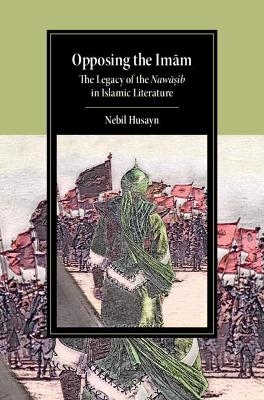
Opposing the Imam
The Legacy of the Nawasib in Islamic Literature
Seiten
2021
Cambridge University Press (Verlag)
978-1-108-83281-6 (ISBN)
Cambridge University Press (Verlag)
978-1-108-83281-6 (ISBN)
Islam's fourth caliph, Ali, can be considered one of the most revered figures in Islamic history. Examining the enduring legacy of the nawasib, early Muslims who were hostile to the ascendancy of Ali and his descendants, this study reveals a period of contestation and the eventual rehabilitation of Ali's reputation in Sunni Islam.
Islam's fourth caliph, Ali, can be considered one of the most revered figures in Islamic history. His nearly universal portrayal in Muslim literature as a pious authority obscures centuries of contestation and the eventual rehabilitation of his character. In this book, Nebil Husayn examines the enduring legacy of the nawasib, early Muslims who disliked Ali and his descendants. The nawasib participated in politics and scholarly discussions on religion at least until the ninth century. However, their virtual disappearance in Muslim societies has led many to ignore their existence and the subtle ways in which their views subsequently affected Islamic historiography and theology. By surveying medieval Muslim literature across multiple genres and traditions including the Sunni, Mu'tazili, and Ibadi, Husayn reconstructs the claims and arguments of the nawasib and illuminates the methods that Sunni scholars employed to gradually rehabilitate the image of Ali from a villainous character to a righteous one.
Islam's fourth caliph, Ali, can be considered one of the most revered figures in Islamic history. His nearly universal portrayal in Muslim literature as a pious authority obscures centuries of contestation and the eventual rehabilitation of his character. In this book, Nebil Husayn examines the enduring legacy of the nawasib, early Muslims who disliked Ali and his descendants. The nawasib participated in politics and scholarly discussions on religion at least until the ninth century. However, their virtual disappearance in Muslim societies has led many to ignore their existence and the subtle ways in which their views subsequently affected Islamic historiography and theology. By surveying medieval Muslim literature across multiple genres and traditions including the Sunni, Mu'tazili, and Ibadi, Husayn reconstructs the claims and arguments of the nawasib and illuminates the methods that Sunni scholars employed to gradually rehabilitate the image of Ali from a villainous character to a righteous one.
Nebil Husayn is Assistant Professor of Religious Studies at the University of Miami where his research considers the development of Islamic theology, historiography and debates on the caliphate. Husayn obtained his Ph.D. in Near Eastern Studies from Princeton University.
Introduction; 1. 'Ali: A Contested Legacy; 2. The Umayyads and the 'Uthmanis; 3. The Mu'tazili: al-Jahiz; 4. The Ibadi: al-Warjalani; 5. The Sunni: Ibn Taymiyya; 6. The Rehabilitation of 'Ali in Sunni Hadith and Historiography; Afterword; Chapter 1 Appendix: Anti-'Alid Statements in Historical Literature; Chapter 2 Appendix: Reports about the Umayyads and the 'Uthmanis; Chapter 5 Appendix: Ibn Taymiyya's Minhaj al-sunna.
| Erscheinungsdatum | 19.04.2021 |
|---|---|
| Reihe/Serie | Cambridge Studies in Islamic Civilization |
| Zusatzinfo | Worked examples or Exercises |
| Verlagsort | Cambridge |
| Sprache | englisch |
| Maße | 230 x 150 mm |
| Gewicht | 510 g |
| Themenwelt | Geisteswissenschaften ► Geschichte ► Regional- / Ländergeschichte |
| Geisteswissenschaften ► Religion / Theologie ► Islam | |
| ISBN-10 | 1-108-83281-4 / 1108832814 |
| ISBN-13 | 978-1-108-83281-6 / 9781108832816 |
| Zustand | Neuware |
| Haben Sie eine Frage zum Produkt? |
Mehr entdecken
aus dem Bereich
aus dem Bereich
Erinnerungen
Buch | Softcover (2024)
Pantheon (Verlag)
16,00 €


